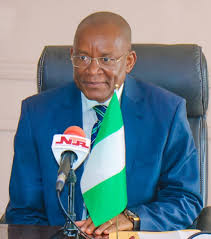Business
FG Plans Roads To Link Crop Processing Zones
The Federal Government has said that it would construct access roads to all Staple Crops Processing Zones (SCPZ) across the country.
The policy is to ensure that farm produce are evacuated to the processing centres on time.
It would be recalled that the Federal Government established SCPZs in parts of the country in a bid to boost crops production.
The centres are located at Kadawa in Kano State; Badeggi in Niger; Epe in Lagos; Adani in Enugu State and Agbodu in Kogi.
The Permanent Secretary, Ministry of Agriculture and Rural Development, Mrs Ibukun Odusote, made the disclosure in Abuja at a joint meeting of the National Development Committee of Fertiliser and Rural Development Departments of the ministry.
Odusote said the access roads would also enable farm produce to reach markets with less difficulty.
She observed that the meeting was to brainstorm and discuss technical papers to be presented at the National Council on Agriculture (NCA) meeting, scheduled for April 22 to April 26 in Abeokuta.
The scribe said that the meeting would also deliberate on the need to up-scale the implementation of the farmers’ registration exercise and the Growth Enhancement Support (GES) programme.
She said that they would also deliberate on the review of the 2012 GES scheme.
“In order to upscale the GES scheme in 2013, the ministry planned to register and reach five million farmers directly with inputs.
“The farmers are to adopt the improved registration technology innovation of Optical Mark Reading forms.
“The idea is to facilitate quick scanning and migration of information to the ministry’s farmers’ database.’’
Odusote urged the meeting to focus on the Agricultural Transformation Agenda (ATA) as a strategy for ensuring good presentation at the NCA meeting, stressing that the ministry was keen on attaining the ATA goal.
Earlier, Director of Fertiliser at the ministry, Mr Akinbolawa Osho, advised participants to endeavour to replicate decisions and suggestions reached at the meeting in their respective states.
Osho promised that farmers would get inputs before every planting season.
The Acting Director of Rural Development in the ministry, Mr Olumuyiwa Azeez, said that their deliberation would be on issues affecting agriculture in the country.
He noted that the meeting would also afford them the opportunity to discuss some issues that would be considered at the NCA meeting in Abeokuta.
Business
CBN Predicts 4.17% GDP Growth In 2025

The Central Bank of Nigeria (CBN) has announced that the 2025 economic indices indicate a positive outlook, with the nation’s GDP expected to accelerate to 4.17 per cent for faster economic growth.
Mr Muhammad Abdullahi, Deputy Governor, Economic Policy Directorate, CBN, revealed this on Tuesday during the 11th edition of the National Economic Outlook: Implications for Businesses in 2025.
The hybrid event, convened in Lagos, was organised by the Chartered Institute of Bankers of Nigeria (CIBN) Centre for Financial Studies in collaboration with B. Adedipe Associates Ltd.
Abdullahi said the nation’s 2025 economic projections remained optimistic with fiscal and monetary reforms already paying off, resulting in the GDP anticipated rise from 3.36 per cent recorded in 2024.
According to him, the growth is anchored on sustained implementation of government reforms, stable crude oil prices, and improvements in domestic oil production.
Abdullahi also stated that stability in the exchange rate would play a crucial role in maintaining the positive trajectory, with the inflation rate projected to decline due to the impact of economic reforms.
“Achieving the targeted inflation rate of 15 per cent in 2025 will require effective collaboration between monetary and fiscal authorities, alongside private sector participation for a stable economic environment,” he said.
The keynote speaker said that the apex bank would prioritise price stability and strengthen the financial sector to support SMEs and critical sectors for businesses to thrive.
Abdullahi noted that the nation’s evolving policy landscape presented both challenges and opportunities for businesses to thrive.
“The government is making deliberate strides to diversify its revenue streams and reduce dependence on the volatile oil sector.
“Through ongoing tax reforms aimed at broadening the tax base and improving collection efficiency, the government is working to establish a more sustainable fiscal environment.
“While these reforms may present challenges in the short term, they are essential for building a more resilient and diversified economy in the long run.
“As businesses, it is crucial to adapt to these changes, understanding that they will ultimately strengthen the economic foundation for future growth.
“As we move forward on this path of exploration and collaboration, we must remain focused on the vast opportunities before us.
“Nigeria’s abundant resources, coupled with the current administration’s commitment to economic reform, offer a fertile ground for innovation, investment, and sustainable growth,” Abdullahi said.
Similarly, Prof. Pius Olanrewaju, President/Chairman of the Council, Chartered Institute of Bankers of Nigeria (CIBN), said 2024 presented both challenges and opportunities.
He noted that the GDP signalled gradual recovery amidst global and domestic pressures.
“As we move into 2025, we are presented with both the opportunity and responsibility to critically examine the economic landscape.
“This forum will help us identify the risks, harness the opportunities, and strategize for the future,” Olarenwaju noted.
He commended the collaboration of experts at the annual event, which included Dr Kabir Katata, Director, Research, Policy and International Relations, Nigeria Deposit Insurance Corporation; and Dr Henrietta Onwuegbuzie of the Lagos Business School.
Others were Akinsola Akeredolu-Ale, CEO, Lagos Commodities and Fixtures Exchange; Mr Akeem Lawal, Managing Director Interswitch (Pure pay); and Chinwe Uzoho, Regional Managing Director, West and Central Africa Network International.
Business
Minister Inspects Nigeria/Benin Republic-owned Sugar Firm … Decries Decrepit Condition

Business
NGA Becomes Official Partner To 29th Gas Conference … As President Set To Address 2025 World Summit


